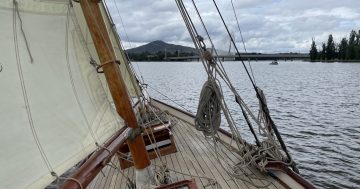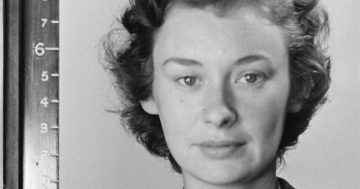
Clare McLellan from the Australian Academy of Science, Dr Malcolm Beazley from the Australian National Museum of Education at the University of Canberra and Ros Russell, Chair of the UNESCO Australian Memory of the World Committee at the launch. Photo: Supplied.
Nominations are now open for Australian treasures to join the likes of the 753-page account of James Cook’s voyage aboard HMS Endeavour and the papers of Edward Koiki Mabo on the UNESCO Australian Memory of the World Register.
The Register honours the nation’s most important documentary heritage – and works to ensure its preservation.
Chair of the UNESCO Australian Memory of the World Committee, Canberra historian and consultant Roslyn Russell, launched the call last week for 2024 nominations.
She said the UNESCO Memory of the World program was established in 2000 to preserve documents that were the physical (and now digital) embodiment of the memories of individuals, nations, regions and the world – and to make them accessible to everyone.
The Australian Register, which has 88 inscriptions of items of historical significance, was established in 2001 with two items of documentary heritage that were already listed on the UNESCO Memory of the World International Register – Cook’s Endeavour Journal and the Mabo papers.
Cook’s Journal, one of the National Library of Australia’s most prized items, was purchased by the Australian Government in 1923 for five thousand pounds at a London auction. In Cook’s hand, it records his charting of the eastern Australian and New Zealand coastlines.
The Mabo case manuscripts, inscribed on the UNESCO Memory of the World Register in 2001, document the decade-long legal battle by Edward Koiki Mabo for the law to recognise Indigenous Australians’ claim to their land. Other items on the Register include the Cinesound Movietone Australian newsreel collection (1929-1975) from the National Sound and Film Archives and the Walter Burley Griffin and Marion Mahony Griffin designs for Canberra.
Dr Russell said groups large and small were invited to nominate for inclusion on the Register if their collection met the criteria.
“For example, if your group received a Community Heritage Grant, that is a good sign that your collection could be worthy of being on the Register because, by being eligible for the grant, already indicates that it is of national significance,” she explained.
The 2024 Register launch was held at the Canberra Heritage Library in Fyshwick, which hosts a display about the Memory of the World Register. Representatives of many of the capital region’s academic institutions, historical societies and other collecting institutions attended, including the National Museum of Education, which operates from the University of Canberra, First Nations groups, the Australian Academy of Science, historians and archivists.
People interested in discovering more about the Register are invited to a workshop on 22 February at the ACT Heritage Library next year. The workshop will take people through the nomination process and advise them on how to address the selection criteria and other sections of the nomination form.
More information about the Register and upcoming workshop is available from UNESCO Australia Memory of the World.

















